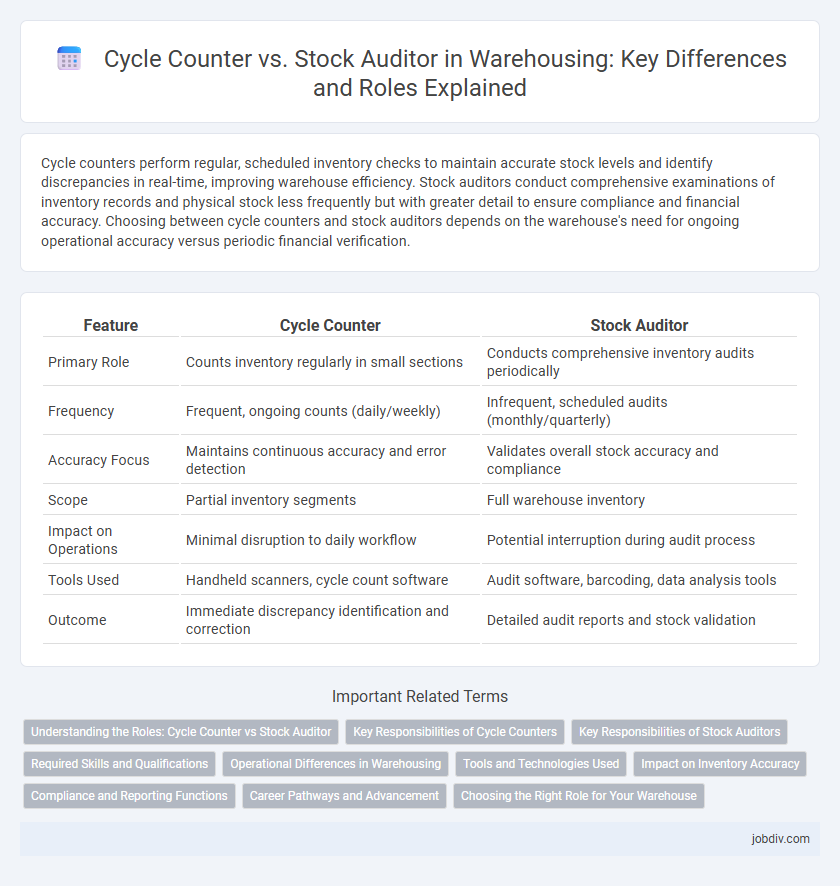Cycle counters perform regular, scheduled inventory checks to maintain accurate stock levels and identify discrepancies in real-time, improving warehouse efficiency. Stock auditors conduct comprehensive examinations of inventory records and physical stock less frequently but with greater detail to ensure compliance and financial accuracy. Choosing between cycle counters and stock auditors depends on the warehouse's need for ongoing operational accuracy versus periodic financial verification.
Table of Comparison
| Feature | Cycle Counter | Stock Auditor |
|---|---|---|
| Primary Role | Counts inventory regularly in small sections | Conducts comprehensive inventory audits periodically |
| Frequency | Frequent, ongoing counts (daily/weekly) | Infrequent, scheduled audits (monthly/quarterly) |
| Accuracy Focus | Maintains continuous accuracy and error detection | Validates overall stock accuracy and compliance |
| Scope | Partial inventory segments | Full warehouse inventory |
| Impact on Operations | Minimal disruption to daily workflow | Potential interruption during audit process |
| Tools Used | Handheld scanners, cycle count software | Audit software, barcoding, data analysis tools |
| Outcome | Immediate discrepancy identification and correction | Detailed audit reports and stock validation |
Understanding the Roles: Cycle Counter vs Stock Auditor
Cycle counters perform regular inventory counts in specific warehouse zones to maintain continuous accuracy and identify discrepancies early. Stock auditors conduct comprehensive audits periodically, verifying overall inventory records, compliance, and financial accuracy. Both roles are essential for effective warehouse inventory management but differ in scope, frequency, and detail of stock verification.
Key Responsibilities of Cycle Counters
Cycle counters are responsible for performing regular inventory counts within the warehouse to ensure accurate stock levels and identify discrepancies promptly. They conduct systematic, scheduled counts of specific product categories or storage locations without disrupting warehouse operations. Their key tasks include verifying inventory accuracy, updating records in warehouse management systems, and collaborating with warehouse staff to resolve variances efficiently.
Key Responsibilities of Stock Auditors
Stock auditors play a critical role in warehousing by verifying the accuracy of inventory records through detailed stock inspections and reconciliation processes. They conduct physical stock counts, identify discrepancies, and ensure compliance with internal controls and regulatory standards. Their responsibilities include reporting variances, investigating causes of stock irregularities, and recommending corrective actions to maintain inventory integrity and prevent financial losses.
Required Skills and Qualifications
Cycle Counters require strong attention to detail, proficiency with inventory management software, and basic math skills to accurately count and record stock levels. Stock Auditors need advanced analytical abilities, knowledge of auditing standards, and experience in identifying discrepancies within financial and inventory records. Both roles demand excellent organizational skills, integrity, and familiarity with warehouse operations to ensure accurate inventory control.
Operational Differences in Warehousing
Cycle counters perform regular, incremental inventory counts during normal warehouse operations to maintain continuous accuracy, minimizing downtime and disruption. Stock auditors conduct comprehensive, periodic audits that often require halting warehouse activities to verify inventory integrity and compliance. The operational difference centers on cycle counters enabling ongoing inventory control, while stock auditors provide detailed, less frequent verification for financial and regulatory purposes.
Tools and Technologies Used
Cycle counters utilize handheld barcode scanners, RFID readers, and mobile inventory management apps to perform real-time stock verification without halting warehouse operations. Stock auditors rely on advanced auditing software, barcode verification systems, and inventory analytics platforms to conduct thorough, periodic evaluations and reconcile discrepancies. Both roles benefit from integrated Warehouse Management Systems (WMS) and cloud-based data solutions, enhancing accuracy and efficiency in inventory control.
Impact on Inventory Accuracy
Cycle counters perform regular, targeted inventory checks that identify discrepancies quickly, significantly enhancing real-time inventory accuracy. Stock auditors conduct comprehensive, periodic audits that provide detailed verification of inventory records, ensuring long-term data integrity. Integrating both approaches optimizes inventory accuracy by combining continuous monitoring with in-depth validation.
Compliance and Reporting Functions
Cycle counters routinely perform inventory verification to ensure compliance with regulatory standards and internal controls, facilitating timely detection of discrepancies. Stock auditors conduct comprehensive evaluations of stock accuracy and adherence to financial reporting requirements, providing detailed audit reports for regulatory bodies and management review. Both roles enhance warehouse compliance and reporting integrity through systematic checks and documentation.
Career Pathways and Advancement
Cycle counters specialize in inventory accuracy by conducting regular physical counts, offering career advancement opportunities into inventory control management and supply chain analysis roles. Stock auditors analyze inventory discrepancies and compliance, leading to career pathways in internal auditing, financial controls, and operational risk management. Both roles serve as foundational positions in warehousing with distinct trajectories toward higher-level management or specialized audit and logistics functions.
Choosing the Right Role for Your Warehouse
Cycle counters perform regular inventory checks to maintain accurate stock levels, reducing discrepancies and improving order fulfillment efficiency. Stock auditors conduct comprehensive audits to verify overall inventory accuracy and compliance, identifying systemic issues and optimizing warehouse processes. Selecting the right role depends on your warehouse size, inventory turnover rate, and the need for ongoing accuracy versus periodic in-depth evaluations.
Cycle Counter vs Stock Auditor Infographic

 jobdiv.com
jobdiv.com